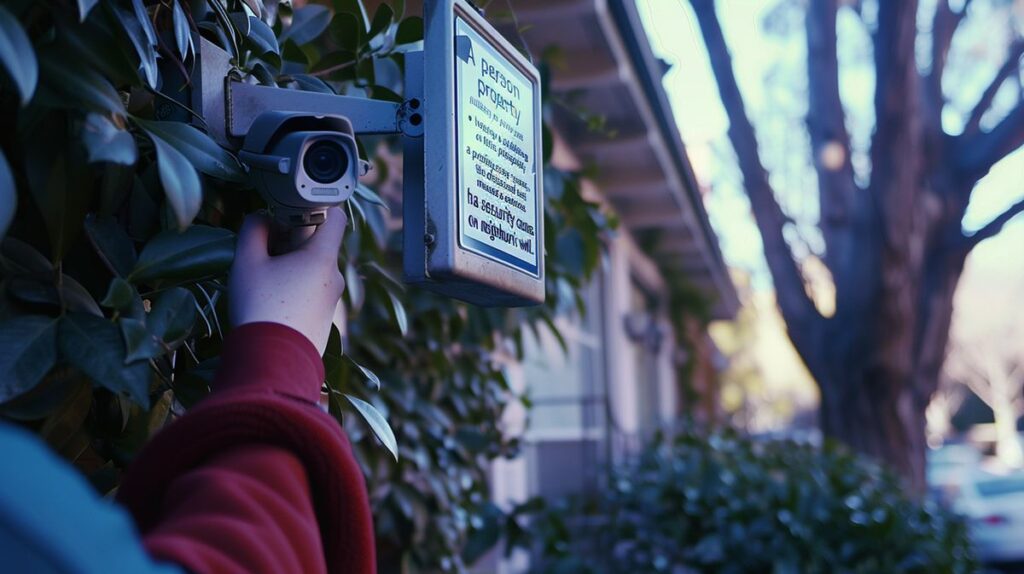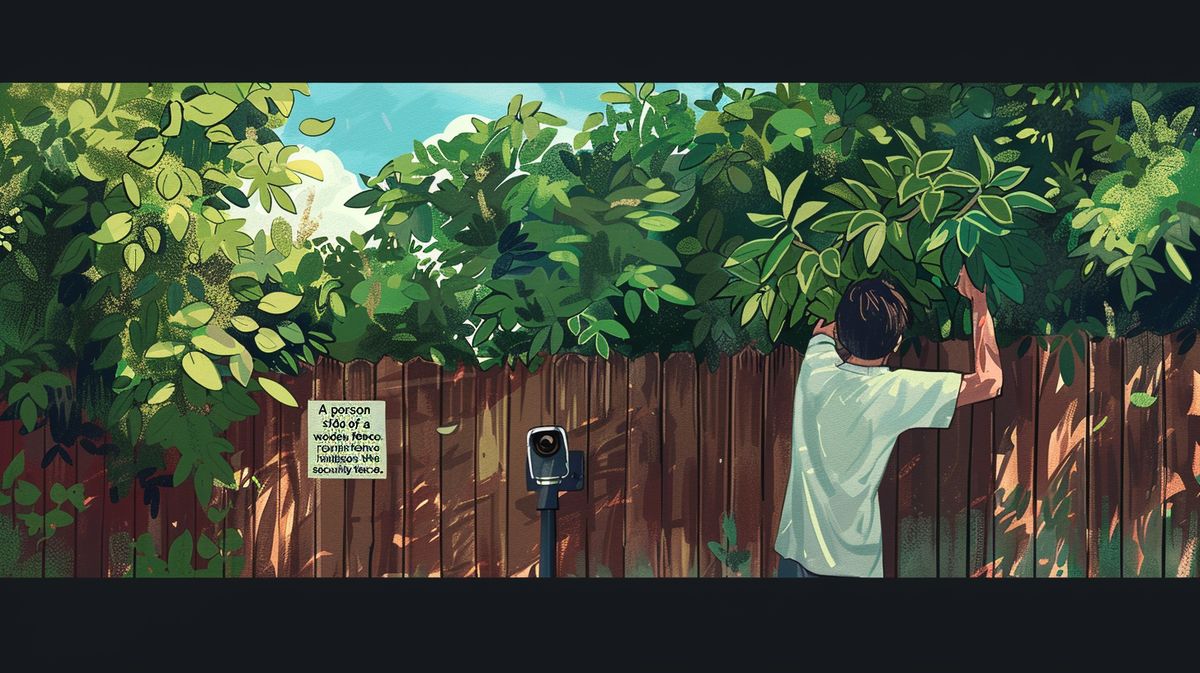Effective Guide: How to Block Neighbors Security Camera Safely & Legally
Welcome neighbor, wondering how to block your neighbor’s security camera? I, James Albright, know the urgency one feels in protecting their privacy at home. Is the constant surveillance invading your peace of mind? Let’s make your home your private sanctuary again, without causing a neighborly fuss or breaking any laws.
This guide is your toolbox filled with practical and effective solutions. It’ll cover everything from strategic landscaping and positioning to the aid of some high-tech solutions. Intrigued? Well, you should be!
So, ready to take control of your privacy? Read on to navigate this somewhat less-discussed area of home security. Together, we’ll ensure your privacy remains uninvaded and uninterrupted.
Effective Communication
When dealing with a neighbor’s security camera invasion, effective communication is key. Building a mutual understanding can often solve issues without conflict. Here’s how to approach the conversation:
Ask Neighbors to Adjust the Camera
- Direct communication is often the most straightforward approach. Reach out respectfully to your neighbor about your privacy concerns.
- Politely request that they adjust the camera’s position or angle so it doesn’t point directly at your property. Express why this is important to you, clearly but courteously.
- Identify specific areas that are problematic and suggest alternative angles or placements for the camera that would still maintain their security without infringing on your privacy.
Suggest Upgrading to Cameras with Privacy Mask Features
- Talk to your neighbor about the benefits of upgrading to security cameras with privacy mask features. These cameras can exclude certain zones from being recorded, ensuring privacy.
- Explain how these features meet both their security needs and respect your own privacy concerns, creating a win-win scenario.
- Offer to help them look for models or even assist with the setup process. This can foster a spirit of cooperation and make them more willing to consider the upgrade.
Utilizing Barriers and Landscaping
Creating physical barriers through strategic landscaping and structures can effectively block a neighbor’s security camera while enhancing your property’s visual appeal. Below are some practical tips to achieve privacy without compromising on aesthetics.
Plant High Trees or Tall Plants
-
Natural Barrier: The strategic planting of high trees or tall plants creates an effective natural barrier.
In this video, learn how to effectively use laser lights to block your neighbor's security camera, demonstrating a practical solution to protect your privacy.
Not only do they add aesthetic value to your property, but they also provide privacy by obstructing the camera’s view. Think of it as a living shield, blending beauty with utility. - Year-Round Coverage: Evergreen trees and fast-growing plant species ensure consistent, year-round blockage. Popular choices include arborvitae, Leyland cypress, and bamboo. These plants keep your space private through all seasons, and they require relatively low maintenance.
- Enhanced Property Beauty: This method helps with how to block neighbors security camera while beautifying your landscape. The lush greenery offers a pleasant sight and ensures your privacy remains intact. It’s like killing two birds with one stone.
Install Fences or Fence Extensions
- Immediate Privacy: Building a new fence or adding extensions to an existing one provides an immediate solution. Fences act as physical barriers, blocking your neighbor’s camera from viewing your property.
- Compliance with Regulations: Ensure that any new fence or extension meets local building codes and regulations. Consulting your local zoning office can help you avoid future headaches. You don’t want to build something just to tear it down later.
- Variety of Options: Choose from materials and designs such as wooden panels, vinyl fencing, or metal slats. These options match your home’s aesthetic while ensuring functional privacy. This way, you combine style with security.

Use Smaller Barriers: Sheds and Basketball Hoops
- Effective Blockers: Smaller structures like sheds or basketball hoops can act as effective blockers. Position these based on the camera’s field of view to obstruct its line of sight efficiently. Imagine blocking an unwanted view while adding functionality to your yard.
- Dual Purpose: These solutions are versatile. Consider integrating door sensors that work with Google Home to enhance both security and convenience in your smart home setup.
- Portability: These options allow for portable privacy solutions. Unlike permanent installations, items like free-standing screens or hoops can be moved as needed to address privacy concerns. This flexibility can be a lifesaver in dynamic situations.
For instance, a well-placed garden shed can serve as a storage solution and a privacy measure, while a basketball hoop adds recreational value. Two-pronged benefits make these options quite attractive.
How to Block Neighbors Security Camera
Disrupting the Camera’s Focus
Achieving a level of privacy against prying eyes doesn’t always require high-end tech.
Simple, everyday items can disrupt your neighbor’s security camera focus, giving you much-needed peace of mind.
Place Moving Objects: Flags or Windmills
- Dynamic elements like flags or garden windmills can interfere with a camera’s focus.
- The constant movement induces blurred footage, reducing the camera’s efficiency.
- Plus, these objects not only help with privacy but also enhance the aesthetic appeal of your property.
Use Curtains, Window Films, or Privacy Screens
Step up your privacy game by transforming your windows into shields. Simple installations can offer significant protection against nosy cameras.
- Hang curtains or blinds to obstruct the camera’s view into your home.
- Install window films to maintain light while ensuring privacy.
- Deploy privacy screens to add another layer of protection; they come in various designs to match your decor.
Installing Reflective Film on Windows
- Reflective films provide privacy by bouncing images back during daylight.
- It’s an affordable, easy-to-install solution.
- Besides privacy, reflective films also help reduce heat and glare inside your home.
Use Bright Floodlights or Motion-Sensor Lights
A bit of strategic lighting can work wonders. Shine a light on your invader’s plans, literally!
- LED floodlights can drastically affect a camera’s night vision.
- Motion-sensor lights can surprise intruders and further impair the camera’s functionality at night.
- Position these lights thoughtfully to maximize their impact on obstructing the camera’s view.

Implementing Legal Security Measures
When dealing with a neighbor’s security camera that seems intrusive, it’s essential to take strategic, legal steps. These measures help you protect your privacy without crossing any legal boundaries.
Install Your Own Security Camera
- Think of installing your own security camera as setting up a protective barrier. It’s an effective deterrent, showing you’re serious about safeguarding your home.
- Angle your camera to cover your property closely. This way, you document any encroachments and gather clear evidence of privacy breaches, which can be critical in disputes.
- This approach not only enhances security but also gives peace of mind. Should legal issues arise, having recorded evidence can be invaluable.
Understand Legal Considerations
- It’s important to remember: damaging a neighbor’s camera is vandalism. Respect their property, even while addressing privacy concerns.
- Get to know your local laws about security cameras.
In this video, attorneys Greg Felman and Edis Sboly discuss the legal implications of your neighbor's security cameras and what constitutes an invasion of privacy. Learn how the placement of these cameras can affect your rights and what steps you can take if you feel your privacy is being infringed upon.
This knowledge helps guide your actions and ensures you stay compliant while protecting your privacy. - Always opt for legal methods to protect your privacy. This helps you avoid potential lawsuits or criminal charges and paves the way for a more amicable resolution with your neighbor.
Identifying the Camera Type
Understanding what type of security camera your neighbor has is crucial. Here’s how you can figure it out and take steps to protect your privacy.
Check for Red Light
- Observe the camera at night: Take a stroll outside after dusk. Look for a flashing red light—it’s a common sign that the camera is actively recording. Spotted one? You likely have an active surveillance camera pointed your way.
- Flashing Red Light: If you notice a red light on the camera, it’s a telltale indicator of an active security system. This simple visual cue can help you decide on necessary actions to safeguard your privacy.
- Determine the best privacy measures: Once you know what kind of camera you’re dealing with, you’ll be better equipped to choose the most effective way to block it. Whether it’s installing a privacy screen or using other methods, understanding the camera type is the first step.
Directly Ask the Neighbor
- Engage in a polite conversation: Start by approaching your neighbor respectfully. Ask them about their camera. More often than not, a calm conversation can lead to mutual respect and a solution that suits you both.
- Inquire about the camera’s purpose and placement: Want to know why the camera is aimed in a particular direction? Simply ask. This can give you clarity and might even prompt your neighbor to adjust its placement.
- Foster a cooperative relationship: Open lines of communication can pave the way for a cooperative agreement. Showing a willingness to understand their perspective might encourage your neighbor to be more accommodating about your privacy concerns.
Seeking Mediation and Legal Advice
When it comes to dealing with your neighbor’s security camera, sometimes you need more than just a friendly chat or technical solution. Mediation and legal guidance can offer concrete paths to protect your privacy and resolve conflicts effectively.
Involve Local Community Mediators
Community mediators can play a crucial role in facilitating discussions and resolving conflicts regarding security camera disputes. Their goal is to help both parties understand each other’s concerns and work towards a compromise, fostering a cooperative atmosphere. Often, this service is provided free or at a low cost, making it an accessible and valuable resource for those seeking peaceful conflict resolution.
Consult a Lawyer for Legal Guidance
Consulting a lawyer can help you fully understand your legal rights concerning privacy issues caused by your neighbor’s security camera. A lawyer can offer options for legal recourse if you feel your privacy is being violated, ensuring you understand the steps needed to protect yourself. Legal guidance helps you take appropriate actions that comply with the law, minimizing the risk of escalating the conflict or incurring legal penalties.
Report Privacy Invasion to Police
If you believe there is a genuine invasion of your privacy due to a neighbor’s security camera, it’s advisable to report the issue to local police authorities. Law enforcement can assess the situation, determine if any laws are being broken, and take necessary actions to address the issue. Make sure to provide solid evidence, such as photos or video documentation, to bolster your claim and help police understand the severity of the situation.

Seek Responses from Local Law Enforcement or City Council
Contact local law enforcement for guidance on regulations and laws regarding the usage and placement of security cameras in your area. Reaching out to your city council can provide you with specific ordinances and municipal codes that govern surveillance practices. These authorities can offer advice, potentially enforce regulations, and help mediate the issue if necessary, ensuring your privacy concerns are addressed properly.
Consult Homeowners Association (HOA)
If you live in a community governed by a Homeowners Association (HOA), consulting them about the issue can be a practical step. HOAs often have specific rules regarding the placement and use of security cameras within the community, and they can enforce these guidelines. The HOA can act as a mediator between you and your neighbor, ensuring that community standards are maintained and both parties’ concerns are considered.
Illegal Methods to Avoid
When figuring out how to block your neighbor’s security camera, it’s crucial to steer clear of actions that can land you in legal trouble.
Actions Leading to Legal Issues
Here are a few methods that are definitely off-limits:
- Avoid using laser pointers: It’s tempting to think a laser pointer can disrupt a camera, but targeting security cameras with lasers could damage the sensors. This is considered vandalism and can lead to property damage claims and legal consequences.
- Refrain from cutting wires or hacking: Tampering with the camera’s hardware, like cutting wires or attempting to hack the system, is illegal. Not only does this open you up to criminal charges, but it can also worsen conflicts with your neighbor.
- Blocking audio or using jammers: Using devices to block audio recordings or deploying signal jammers to disable the camera’s transmission is another big no-no. These actions often violate federal and local laws, potentially leading to significant legal problems and hefty fines.
Understand the Legality of Blocking Cameras
It’s imperative to understand the legal fringe within which you can operate when considering how to block your neighbor’s security camera.
- Adhere to legal boundaries: Any methods you employ should fall within legal limits. Non-invasive solutions like planting trees or installing curtains are both preferable and lawful, providing peace without legal fallout.
- Avoid escalations: Aggressive tactics can increase tensions and complicate matters further. Opting for respectful and peaceful solutions is always the better route for addressing privacy concerns.
- Legal and peaceful solutions: Always prefer legal and diplomatic measures to avoid criminal charges or potential lawsuits. Erecting fences, talking directly with neighbors, or seeking legal advice from a professional are both effective and lawful strategies you might explore.
Advanced Security Measures
In today’s world, protecting your privacy from prying eyes, including neighbors’ security cameras, has become paramount. Let’s delve into some cutting-edge tools you can use to shield your private space.
Use Anti-Camera Laser Devices and Camera Lens Jammers
- Anti-Camera Lasers: Think of these as your personal spotlight that blocks unwanted surveillance. These devices shoot out a strong light beam, messing up the camera’s ability to see clearly. It’s like shining a flashlight directly into someone’s eyes—they just can’t see anything. This is your go-to for high-tech privacy.
- Camera Lens Jammers: Imagine you’re trying to listen to your favorite song, but there’s a constant static noise. Annoying, right? Camera lens jammers do something similar by sending out interference that messes with the camera’s operation. You get the upper hand, but remember, it’s crucial to stay within legal limits to avoid trouble.
- Legal Considerations: Here’s where things get serious. Before you get laser-happy or start jamming, check your local laws. Misusing these devices can land you in hot water. Think of it like driving; you don’t want to speed through a school zone. So, always ensure you’re on the right side of the law.
Conclusion
1. **Summarize the Importance of Addressing Privacy Concerns Legally and Respectfully**
Addressing privacy concerns with a neighbor’s security camera must be approached legally and respectfully. Think of it as nurturing trust with a neighbor—start with a polite conversation to share your worries. This sets a tone of cooperation and can lead to easier, mutually agreeable solutions. A friendly chat can work wonders and keep things peaceful.
2. **Emphasize Effective Communication and Legal Barriers as the Best Approach**

Effective communication is your best bet here, as it can help resolve conflicts peacefully, much like the strategies discussed in resolving workplace conflicts found [here](https://www.businessnewsdaily.com/8766-resolving-workplace-conflicts.html). Imagine discussing a small fence with a neighbor over coffee to keep your space more private—suggest simple changes like adjusting the camera’s focus or using privacy masks. When talking doesn’t help, consider practical, legal solutions. Plant tall bushes, put up fences, or position outdoor structures to block the camera’s view. These actions respect the law and your neighbor’s security needs.
3. **Reiterate the Potential Consequences of Using Illegal Methods and Encourage Seeking Mediation and Legal Advice when Necessary**
It’s tempting to go rogue to reclaim privacy, but beware—illegal actions can lead to serious trouble, like vandalism charges or being labelled an intruder. Instead, stick to peace and legality. Think of mediation as calling in a trusted community elder to help resolve disputes. Reach out to community services or legal advisors. Even local authorities or homeowners associations can offer guidance. This method not only upholds the law but also enhances the chances of a lasting, harmonious resolution.
FAQ
What are some legal methods to block a neighbor’s security camera?
If your neighbor’s security camera is intruding on your privacy, there are several legal ways to address this issue:
- Use natural barriers like trees and tall plants to obstruct the view.
- Install fences or add extensions to existing fences.
- Utilize indoor solutions such as curtains, window films, and privacy screens to block the camera from inside your home.
- Install bright floodlights or motion-sensor lights to interfere with the camera’s ability to capture clear footage.
- Communicate directly with your neighbor to seek a mutually agreeable solution.
How can I talk to my neighbor about their security camera?
Approaching your neighbor to discuss their security camera can be tricky, but it’s important for maintaining good relations:
- Approach the discussion politely and express your privacy concerns clearly.
- Suggest repositioning the camera or using privacy mask features.
- Offer to help with research or installation to show cooperation and goodwill.
What types of barriers can I use to block the camera’s view?
Blocking a camera’s view can be achieved using various types of barriers:
- High trees, tall plants, and landscaping features can obstruct the line of sight.
- Fences, fence extensions, and even smaller structures like sheds or basketball hoops can block the view.
- Indoor barriers like curtains, window films, and privacy screens are effective ways to prevent cameras from seeing inside your home.
Can I use bright lights to block my neighbor’s security camera at night?
Yes, bright floodlights and motion-sensor lights can effectively hinder a security camera’s night vision. Position these lights strategically to maximize their effectiveness but ensure they don’t lead to additional disputes or safety concerns.
What should I do if my neighbor refuses to adjust their camera?
If your neighbor is unwilling to cooperate, there are several steps you can take:
- Seek mediation through local community services or neighborhood mediation centers.
- Consult a lawyer for legal advice to understand your rights.
- Report privacy invasion to the police if necessary.
- Contact local law enforcement or your city council for additional guidance.
- Consult your homeowners association (HOA) for potential intervention.
I’m James Albright, a home security expert with over 15 years of experience, and I’m passionate about helping families protect what matters most. After serving as a police officer, I transitioned to security consulting to share my hands-on knowledge and practical tips. My mission is to make home security simple and reliable by offering clear, no-nonsense advice and easy-to-follow guides. When I’m not reviewing the latest security tech or writing, I’m out in the community leading neighborhood watch programs and, most importantly, keeping my own family safe.





Post Comment